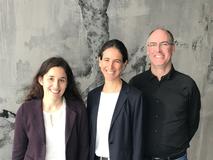Startups Advancing Bone Repair, Aluminum Extrusion, Tissue Regeneration, and Micropollutant Extraction, Win CHF 10,000 Each
21.11.2019
Learn more about the Swiss science spin-offs developing better biomaterial for fragile bones, tech to detect surface defects, structures to reconstruct our post-surgery bodies, and sustainable purification to remove pollution from life's most-important ingredient.
 FLOWBONE, OptoGuard, Regenosca, and Wastewater Purification Reactors
|
 FLOWBONE: Ulrike Kettenberger, Laurence Rivier and Ken MacLean
|
 OptoGuard: Felix Linnenschmidt and Felix Maximilian Neuhauser
|
 Regenosca: Eva-Maria Balet and Mattias Larsson
|
 Wastewater Purification Reactors: Fajer Mushtaq
|
The winning founders from FLOWBONE, OptoGuard, Regenosca and Wastewater Purification Reactors receive Venture Kick's first stage of pre-seed funding, network support, and entrepreneurial training.
FLOWBONE: injectable biomaterial for bone repair
FLOWBONE: injectable biomaterial for bone repair
As our societies age, orthopedic surgeons see more patients with bone fractures. Today every 3rd woman and every 5th man over 50 will experience a fracture. Unfortunately, drugs used to treat bone fragility are unspecific and slow, while bone cement injections aren't clearly beneficial. FLOWBONE's injectable biomaterial, the result of more than six years research at EPFL, allows fragilized bone to augment and repair itself, without impeding bone mechanics or blood flow within the tissue. The team of inventor Ulrike Kettenberger, Laurence Rivier and Ken MacLean are now preparing for clinical studies.
OptoGuard: AI for flaw-detection in aluminum extrusion
Surface quality defects in extruded aluminum mean that every day 10,000 tons of metalwork go straight to recycling, instead of customers. Currently, surface quality control is performed by humans, which prevents full-automation in the aluminum production process. ETH Zurich graduates Felix Linnenschmidt and Felix Maximilian Neuhauser have prototyped a rapid, surface-defect-detection system that will help aluminum producers satisfy more clients' quality specifications in the CHF 70-billion extruded aluminum industry. After a successful proof-of-concept with an industrial client, the co-founders plan to commercialize their flexible and precise technology to reduce material and energy waste in aluminum production.
Regenosca: off-the-shelf scaffolds for better tissue regeneration, no scarring
After operations on the urethra or bladder patients often need tissue grafts or synthetic meshes to fill the voids in their bodies. Grafts can be painful, while synthetic options are prone to failure. Regenosca's patented medical device -- a scaffold that induces better tissue regeneration in reconstructive surgery -- provides a shapeable, off-the-shelf alternative that's quicker and easier to handle than current technology. The team of surgeons and EPFL scientists Mattias Larsson, Eva-Maria Balet, Kalitha Pinnagoda, and Ganesh Vythilingam are now preparing a first-in-human study.
Wastewater Purification Reactors: smart membranes to remove micro-pollutants
Treating water and wastewater is a market set to grow to $675 billion by 2025. At the same time governments in countries such as Switzerland are passing stricter water protection laws to require the removal of microscopic pollutants such as hormones, antibiotics and insecticides, which can't simply be filtered by conventional means. ETH post-doc Fajer Mushtaq is patenting a smart membrane that will help pharmaceutical and chemical plants, hospital and wastewater sites remove more than 90 percent of micropollutants, using only sunlight, vibrations and magnetic fields. With team members Silvan Staufert and Harun Torlakcik, Mushtaq is building a larger prototype for a pilot study at a Swiss hospital, and preparing demonstrations for other potential customers.


